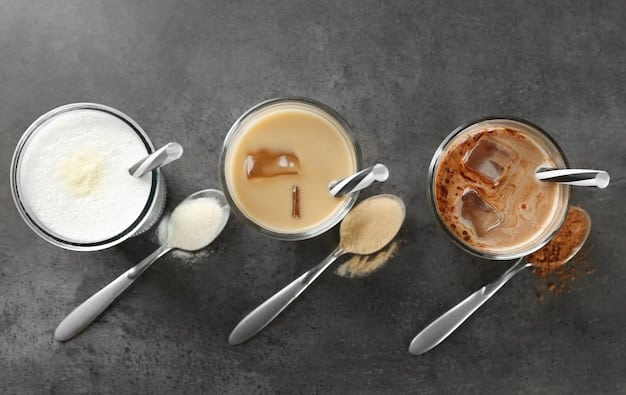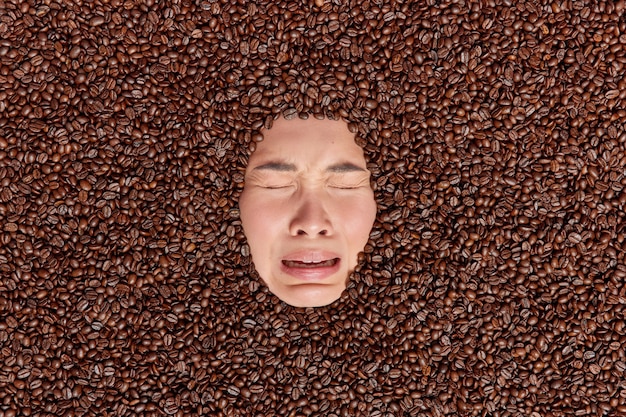Mind-Blowing: Americans Drink Over 400 Million Cups of Coffee Daily

Americans consume over 400 million cups of coffee every day, showcasing the beverage’s massive popularity and its integral role in the nation’s daily routines, economy, and social fabric.
Did you know that the aroma of freshly brewed coffee isn’t just a morning delight, but a daily ritual shared by millions across the United States? Prepare to have your perceptions perked up by this mind-blowing fact: Americans consume over 400 million cups of coffee every day. Let’s dive into the caffeinated culture that fuels the nation.
Why is Coffee so Popular in America?
Coffee’s popularity in America is more than just a trend; it’s deeply rooted in history, culture, and convenience. From its colonial origins to its modern-day ubiquity, coffee has become an integral part of the American experience.
Several factors contribute to the nation’s love affair with coffee. The beverage provides a much-needed energy boost, fosters social connections, and offers a diverse range of flavors and brewing methods to satisfy diverse palates.
Historical Roots
Coffee’s journey to becoming an American staple began in the colonial era. Initially, tea was the preferred beverage, but the Boston Tea Party in 1773 shifted preferences towards coffee as a patriotic choice.
Coffeehouses emerged as important social and business hubs in cities like New York and Philadelphia, laying the foundation for the coffee culture we know today.
The Energy Boost Factor
In a fast-paced society that values productivity and efficiency, coffee has become the go-to beverage for quick energy. Caffeine stimulates the central nervous system, increasing alertness and reducing fatigue.
The morning cup of coffee has become a ritual for many Americans, helping them kickstart their day and tackle demanding tasks.
- ☕ Coffee provides a mental and physical boost.
- ⏱️ Americans use coffee to increase productivity.
- 🧠 Caffeine combats fatigue and enhances focus.
Coffee’s widespread availability, variety, and perceived health benefits all contribute to its enduring popularity in the United States, securing its place as a beloved national beverage.

The Economic Impact of America’s Coffee Consumption
Beyond its cultural significance, coffee consumption in America has a substantial economic impact, affecting industries ranging from agriculture to retail. The coffee industry generates billions of dollars in revenue annually and employs millions of people.
The economic impact is felt across the entire supply chain, from coffee farmers in producing countries to baristas in local cafes. Let’s explore this economic landscape in more detail.
Coffee’s Role in International Trade
The United States is one of the largest importers of coffee in the world, creating a significant demand for coffee beans grown in countries like Brazil, Colombia, and Vietnam. This trade relationship supports the economies of these producing nations.
The coffee trade also fosters international cooperation and contributes to global economic stability.
The Coffee Retail Market
The coffee retail market in America is vast and diverse, encompassing coffee shops, cafes, and supermarkets. Chains like Starbucks and Dunkin’ Donuts dominate the market, but independent coffee shops also thrive by offering unique experiences and specialty brews.
The retail market contributes billions to the U.S. economy through sales, employment, and taxes.
- 🏢 Retail coffee chains employ many Americans.
- 💸 They generate revenue through coffee sales and merchandise.
- 税 Taxes from coffee sales contribute to local economies.
The widespread consumption of coffee not only defines cultural habits but also plays a vital role in economic ecosystems, solidifying its place as an indispensable part of American life.
Health Benefits and Concerns
Coffee is more than just a pick-me-up; it has potential health benefits. However, it’s crucial to consider both the advantages and potential drawbacks of regular coffee consumption.
While moderate consumption can offer several health benefits, excessive intake can lead to unwanted side effects. Let’s examine the science behind coffee’s effects on your health.

Potential Health Benefits
Studies have shown that moderate coffee consumption may be associated with a reduced risk of certain diseases, such as type 2 diabetes, Parkinson’s disease, and liver cancer. Coffee is also a rich source of antioxidants, which protect the body against cellular damage.
The caffeine content in coffee can enhance cognitive function, improve physical performance, and boost mood.
Possible Health Concerns
Excessive coffee consumption can lead to side effects such as anxiety, insomnia, and digestive issues. High caffeine intake can also increase heart rate and blood pressure, posing risks for individuals with cardiovascular conditions.
It’s important to be mindful of your caffeine intake and consult with a healthcare professional if you have concerns.
- ❤️ Coffee can provide antioxidants and lower risk of some diseases.
- ⚠️ Overconsumption may cause anxiety and disrupt sleep.
- ☕ Moderation is key for a healthy coffee habit.
Balanced coffee consumption can offer health benefits, but it’s crucial to be aware of potential risks and customize your intake based on personal health needs.
The Different Types of Coffee Consumption in the US
The way Americans enjoy their 400 million cups of coffee varies greatly. From traditional drip coffee to specialty espresso drinks, the options are endless.
Understanding regional preferences, generational trends, and the rise of new brewing methods can help illustrate the diversity of America’s coffee culture.
Regional Preferences
Coffee preferences often differ by region. In the Pacific Northwest, for example, specialty coffee shops and espresso drinks are particularly popular. The East Coast, on the other hand, tends to favor traditional drip coffee and medium roasts.
The South has its unique traditions, such as chicory coffee in New Orleans.
Generational Trends
Younger generations, like Millennials and Gen Z, are driving the demand for iced coffee, cold brew, and specialty coffee drinks. Older generations often stick to classic brewing methods and black coffee.
Social media and the influence of coffee influencers play a significant role in shaping the coffee preferences of younger consumers.
- 📍 Regional tastes vary by location in the U.S.
- 🌱 Younger generations prefer innovative coffee.
- 👴 Older generations prefer classic coffee.
Staying abreast of consumption trends and preferences is crucial for coffee shops and brands looking to cater to diverse tastes and sustain engagement in a competitive market.
The Environmental Impact
Coffee production has environmental implications, from deforestation to water usage. In the face of climate change and growing environmental consciousness, sustainable practices become paramount.
Exploring sustainable options can promote both environmental health and ethical livelihoods for coffee farmers and their communities.
Deforestation and Habitat Loss
Conventional coffee farming can lead to deforestation as forests are cleared to make way for coffee plantations. This habitat loss threatens biodiversity and contributes to climate change.
Shade-grown coffee, which is cultivated under a canopy of trees, provides a more sustainable alternative by preserving natural habitats.
Sustainable Coffee Practices
Sustainable coffee practices include organic farming, fair trade certifications, and water conservation measures. These practices minimize environmental impact and ensure fair wages and working conditions for coffee farmers.
Consumers can support sustainability by choosing certified organic and fair-trade coffee brands.
- 🌳 Shade-grown coffee reduces deforestation.
- 💧 Water conservation techniques reduce water waste.
- 🤝 Fair trade certifications ensure ethical farming.
Prioritizing sustainability in coffee farming and consumption empowers both consumers and producers to forge a more environmentally responsible and ethically sound future.
Coffee and Culture
Coffee is a social lubricant, a ritual, and a cultural icon. In America, coffee is intertwined with various aspects of daily life, from morning routines to social gatherings.
Let’s discuss how coffee’s integration into social contexts, traditions, and artistic expressions strengthens its cultural standing in the United States.
Coffee as a Social Lubricant
Coffee shops often serve as meeting places for friends, colleagues, and dates. Coffee provides a comfortable and casual setting for conversation and connection.
Many business deals and creative collaborations begin over a cup of coffee.
Coffee in Daily Routines
For many Americans, coffee is an essential part of their morning routine. The ritual of brewing and savoring a cup of coffee helps set the tone for the day.
Coffee breaks are also a common practice in workplaces, providing a moment of respite and rejuvenation.
- 🤝 Coffee encourages interactions in social settings.
- 📅 People incorporate it into their daily rituals.
- 🎨 Coffee inspires cultural and artistic works.
Acknowledging coffee’s cultural significance demonstrates its influence on individual schedules and group interactions, marking it as a crucial element in shaping communities and personal experiences.
| Key Point | Brief Description |
|---|---|
| ☕ Coffee Popularity | Rooted in energy boost, social connections, and flavor variety. |
| 💰 Economic Impact | Supports international trade and employs millions in retail. |
| ⚕️ Health Effects | Offers benefits like antioxidants but poses risks with excess. |
| 🌱 Environmental Impact | Includes deforestation; sustainable practices are crucial. |
Frequently Asked Questions
▼
Americans consume over 400 million cups of coffee every day. This substantial intake underscores coffee’s integral role in the nation’s daily routines.
▼
Initially, tea was preferred, but the Boston Tea Party led Americans to embrace coffee. Coffeehouses then became vital social and business hubs.
▼
Coffee may reduce the risk of type 2 diabetes, Parkinson’s, and liver cancer. It is also a good source of antioxidants that protect against cellular damage.
▼
The United States imports coffee from countries like Brazil and Colombia. This demand boosts these economies and enhances global economic cooperation.
▼
Sustainable coffee practices include organic farming, fair trade certifications, and water conservation measures to decrease environmental impact and ensure fair labor practices.
Conclusion
The mind-blowing fact that Americans consume over 400 million cups of coffee every day highlights coffee’s ingrained presence in American society. From its economic implications to its cultural significance and health considerations, coffee’s story in the U.S. is both complex and compelling, reflecting a nation fueled by this beloved beverage.





